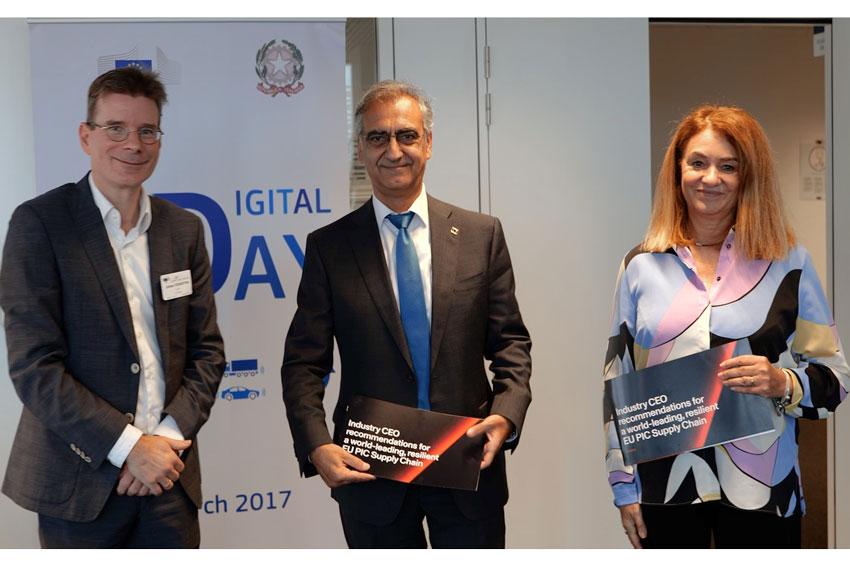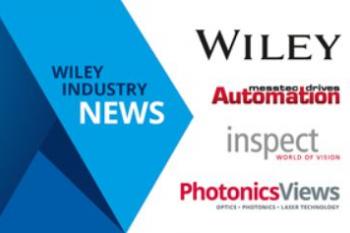Call on the EU to support building a resilient supply chain for PICs
07.11.2023 - Europe’s largest integrated photonics companies announced their proposal at this week’s PIC Summit held in Eindhoven.
A group of CEOs present the EU Commission with a 4.25 billion euro plan to support growth of the industry which is critical to applications including high speed internet, data security, autonomous vehicles and quantum computing.
CEOs from eight of Europe’s largest integrated photonics companies have presented Thomas Skordas, deputy director-general, DG Connect, and Lucilla Sioli, director for artificial intelligence and digital industry, DG Connect, and Werner Steinhögl, head of sector, unit for microelectronics and photonics for the European Commission, a plan to build a resilient European supply chain for photonic integrated circuits.
The plan calls for 4.25 billion euros in funding over eight years and a range of recommendations to enable the European integrated photonics industry to become a global leader and have the ability to supply EU customers autonomously. Photonic integrated circuits (PICs) open the door to the creation of smaller, faster and more energy-efficient devices. They are already being used in a range of innovations including tele and datacom, autonomous vehicles, quantum communication and agriculture.
The group states that the low level of EU manufacturing capacity and over-reliance on Asia threatens the EU’s economic security and resilience. Currently, less than 6 % of the manufacturing of indium phosphide and silicon nitride PICs is done in the EU and less than 4 % of global assembly, testing and packaging capacity resides in Europe. Furthermore, research by Dutch photonics ecosystem PhotonDelta highlights that competitor nations are making concerted efforts to acquire PIC technologies and assets along with seeking stakes in EU SMEs companies in the supply chain.
The CEOs of XFAB (Germany / France), Smart Photonics (The Netherlands), Aixtron (Germany), Phix Photonics Assembly (The Netherlands), VLC Photonics (Spain), Almae (France), Ligentec (Switzerland / France) and PhotonDelta (The Netherlands), unveiled the plan at PIC Summit Europe in front of more than 500 members of the global photonics and semiconductor communities.
The proposal makes a number of recommendations including:
• Provide over €2B in incentives for industrial scale InP and SiN PIC manufacturing capacity in Europe.
• Provide EU PIC SMEs access to industrial PIC Test and Experimentation facilities (TEF’s) that partly mirror commercial lines, with the latest commercial wafer processing equipment and tools, at the relevant industry standard wafer sizes
• Establish an industrial PIC ‘manufacturing supply chain’ resilience fund of €200 million to support the investments needed to strengthen linkages and minimise vulnerabilities.
• Provide a €360M fund to stimulate application development through offering design tape-outs, leading to industrial photonic design IP creation and validation based on hardware testing
• Promote and incentivize collaboration amongst vertical clusters and the European PIC ecosystem
Johan Feenstra, CEO of Smart Photonics, said: “Over the past few years we have been repeatedly reminded that the world is becoming a more volatile and unpredictable place. Global supply chains have been shown to be fragile, and overreliance on one country for critical components is an economic and security risk. This is particularly true of the semiconductor industry.”
Photonic integrated circuits have the capacity to transform a huge range of industries. It is also fundamental to the advancement of some of the most exciting new technologies. Currently, the EU has a vibrant and growing integrated photonics industry, however, without volume manufacturing, testing, and packaging capacity, its industry is vulnerable to global events and the policies of competitor countries.
“Our proposal outlines a number of practical steps that the EU can take over the next decade to ensure the continued growth and security of the integrated photonics industry. For just over four billion euros we can build our supply chain and ensure the future of an industry which has the capacity to generate hundreds of billions of Euros each year for decades to come,” Feenstra concludes.





